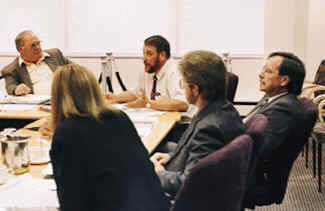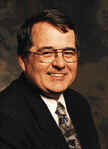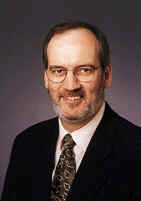"The best solution
is the solution closest to the problem."
By Denys Giguère
Investigations and Hearings
co-ordinator Patrick O’Neill is very careful
when he explains how the Ontario College of Teachers
will deal with complaints against teachers – a
reflection of how the department intends to do
business.
O’Neill, a
veteran of 28 years on the senior staff of the
Ontario, English, Catholic Teachers Association,
stresses that success for the department is striking
the fine balance that will make both the public and
teachers feel confident about the College’s
investigation and hearing process.
"We are
here to ensure that the teaching profession upholds
what is commonly agreed are acceptable
standards," says O’Neill. "Our role is
to provide members of the public with a fair and open
process to deal with their complaints when they feel
that standards are not met, and attempts to redress
the situation have failed.
"It’s
also absolutely vital to give teachers fair and due
process," adds O’Neill. Three committees
– all chaired by practicing teachers – are
responsible for ensuring that both the public
interest and teachers’ rights are protected.
 |
Committees Lead
the Way |
 |
Veterans Head
Staff |
The first
is the Investigation Committee, chaired by Hamilton
secondary teacher Harry Mulvale. If the members of that
committee refer a complaint to a public hearing, it
goes to either the Fitness to Practise Committee,
chaired by Marilyn Laframboise from Amherstburg’s
École St-Jean-Baptiste, or the Discipline Committee,
chaired by George Merrett, a principal-teacher
from Harrow.
"The
authority to make decisions rests with these three
committees, which bring together elected members from
the school system and appointed members of the
public," says O’Neill. "The mix of
elected teachers and appointed members of the public
assures the impartiality and fairness of the
process."
Other key staff
members who work with Council members to resolve
complaints are lawyer Claire Barcik, the
department’s senior investigator, and longtime
teacher Laurent Joncas, former president of the
Association des enseignantes et des enseignants
franco-ontariens (AEFO) and now senior intake officer
with the College.
How
complaints are handled
The process the
College of Teachers follows to deal with complaints
is not unlike that of most other colleges. In fact,
the College consulted with a number of them –
including social workers, nurses and doctors –
to begin to establish its own process.

Investigation Committee
member Michel Gravelle, a science and math teacher
from Val Caron, makes a point at a recent committee
meeting. Committee members, clockwise from left: Doug
Carter, an elementary teacher from Gloucester;
Gravelle; John Cruickshank, an elementary school
principal from Mississauga; committee chair Harry
Mulvale, a secondary teacher from Hamilton. College
staffer Claire Barcik has her back to the camera.
"Teaching
is a human endeavour, and communications is
paramount," says Joncas, whose unit is the first
point of contact for people who want to raise a
complaint about a member of the College.
"Usually, issues don’t get resolved because
of a lack of communication or an inability to find an
appropriate solution.’’
The first step
when a call comes in is to make sure that the College
is the right place to call. Is the complaint directed
at a member of the College? Have other avenues of
resolution been explored? Is the teacher aware of the
problem? Has the school principal been informed?
These are all
questions that will be asked early on in the
conversation to evaluate the seriousness of the call
and determine if there are alternate ways to find a
resolution.
"What we
want to stress the most is that the best solution is
the solution closest to the problem," insists
O’Neill. "If somebody wants to lodge a
complaint at the College, but hasn’t tried to
solve the problem at the school level, we’ll
definitely encourage him or her to go that way first.
The College is not an option to avoid dealing with a
teacher, a principal or a local school board.
"In the
same way," says O’Neill, "the College
is not here to do the job of the employer when it
comes to supervising teachers in the classroom.
Regulation 298 is still in place. That means that
principals and superintendents are still responsible
for supervising teaching and programs."
If attempts at
solving the problem have failed, the College’s
staff member taking the call will explain carefully
how to file a formal complaint and what will be
required of the caller before an investigation is
launched. For example, all complaints have to be
filed in writing, follow a set format, give the name
of the member the complaint relates to and must be
signed by the complainant. This standard procedure
ensures that both parties involved have access to the
same, complete information.
Teachers and
complainants are both assured that complaints will be
dealt with promptly, because the Ontario College
of Teachers Act requires the College to make
every effort to resolve a complaint within 120 days.
An
investigation is launched
Filing a
written complaint marks the beginning of a thorough
fact-finding process that starts with assigning an
investigator whose role is not to find out who’s
right and who’s wrong, but to collect all
pertinent information to the allegations.
"We are
looking for facts," says lawyer Claire Barcik,
who heads the investigation team. "And we have
to make sure that the information we collect is
complete. Teachers have a right to fully understand
the nature of the complaint against them so they can
respond to it."
An
investigation report would generally include a
statement of facts from the complainant, a response
from the member of the College, information
previously collected on the case at the school or
board level, information provided by
witnesses, and any other relevant information,
such as applicable laws and regulations.
Once completed,
an investigation report is shared with the
complainant and the member, as well as the
College’s Investigation Committee.
"A number
of options are open to the Investigation Committee
based on the facts collected during the
investigation," says committee chair Harry
Mulvale. "Our goal is to find the most
appropriate solution to the matter based on the
information before us."
The
goal is to reach a resolution
The options
available to the Investigation Committee may include
dismissing a case for lack of evidence, or requiring
a member to be cautioned or admonished. In some
cases, the committee may simply hold off on making a
decision to help the parties reach a compromise or a
resolution.
Another avenue
for the Investigation Committee is to refer the case,
in whole or in part, to the Fitness to Practise
Committee – in cases of incapacity – or to
the Discipline Committee – in cases of
professional misconduct or incompetence. A case
referred to these two committees would most likely go
to a full hearing.
If a public
hearing finds that allegations against a teacher are
unfounded, Professionally Speaking will report that
the allegations were dismissed if the teacher wants
to be cleared publicly.
"Cases
will be directed to the Discipline Committee or the
Fitness to Practise Committee based on serious
concerns brought to light in the course of the
investigation," says Mulvale. "A full range
of solutions will be considered, from postponing a
penalty with conditions to be met in specified
timeframe to imposing conditions on a certificate, or
suspending or revoking a licence."
"From the
very beginning until a matter is resolved, our goal
is to solve the problem," concludes
O’Neill. "If there’s a possibility to
reach a resolution that will be acceptable to both
parties, there is no doubt that we will do everything
possible to reach it."
For more information on the
Investigations and Hearings Department, visit the
department’s home page
.
Committees Lead the Way
The chairs of
all three College committees that will deal with
complaints against teachers stress the importance of
judgement in resolving cases.
 |
Investigation
–
Harry Mulvale |
The Investigation Committee plays
a pivotal role in the investigation process as it
makes the initial decision on how a complaint can
best be resolved. This group of five elected and two
public members can either handle the case itself or
refer it to one of the other two committees.
"We have
many options to come up with a resolution that
satisfies both parties," says secondary teacher
Harry Mulvale, who chairs the committee. "If
there are grounds to question a teacher’s
capacity to teach, competence or conduct, the case
will be referred to the appropriate committee to
determine how to address these concerns."
 |
Fitness
to Practise –
Marilyn Laframboise |
This small committee of three
teachers and two public members is chaired by
elementary teacher Marilyn Laframboise. Its
responsibility is to determine whether or not a
teacher who’s been the subject of a complaint
has the capacity to teach, and if not, what actions
are needed to redress the situation.
"The
emphasis of the Fitness to Practise Committee is on
rehabilitating the teacher suffering from physical,
mental and emotional disorders," says Mrs.
Laframboise. "Issues may be quite complex and
require both good judgement and sensitivity.
Decisions made will reflect the need to protect the
public interest and to give fair treatment to the
teacher."
 |
Discipline
–
George Merrett |
The Discipline Committee is the
largest of all three committees with 11 members,
including four public appointees. Its size is due to
the committee’s need to be fully accountable to
the public and the complexity of the cases it will
take on.
"Professional
misconduct and incompetence are very serious
allegations," says committee chair George
Merrett, an elementary principal-teacher from Harrow.
"Parents, teachers and the public need to know
that we will deal with these serious allegations
fairly and appropriately while acting in the interest
of the public and the profession. The members of the
Discipline Committee certainly realize the extreme
importance of their deliberations and are looking
forward to ensuring that the students of Ontario are
taught by competent, trustworthy teachers."
Veterans Head Staff

Patrick O’Neill |
Patrick O’Neill brings a
broad range of experience to the job of co-ordinator
of the College’s Investigations and Hearings
Department. With 28 years on the senior staff of the
Ontario Catholic English Teachers’ Association
(OECTA), O’Neill is a seasoned veteran when it
comes to dealing with issues like criminal
prosecution, dismissal, professional misconduct,
illness and disability, and issues of ethics and
competence.
Before joining
OECTA’s staff, O’Neill was himself a
teacher in his native Ireland and in Metropolitan
Toronto. He is a graduate of St. Mary’s College
of the University of London Institute of Education
(England), York University and the University of
Toronto.

Claire Barcik |
Claire Barcik is senior
investigator/
manager of the Investigations Unit. She leads the
Investigations Unit staff in conducting
investigations and developing policies for
investigations and mediation.
She previously
worked at the College of Psychologists of Ontario in
the field of complaints and
discipline. A lawyer with a background in psychology,
Barcik is a graduate of the University of Toronto and
the University
of Ottawa, and also studied at the Université Laval
in Québec City.

Laurent Joncas |
Laurent Joncas can look at
teaching issues from a number of perspectives.
An English
teacher for 23 years, Joncas is a former president of
the Association des enseignantes et des enseignants
franco-ontariens (AEFO), second vice-president of the
Ontario Teachers’ Federation and education
officer at the Ministry of Education and Training. He
also served as a member on a number of
teaching-related committees and was a director of the
Canadian Teachers’ Federation.
Joncas is
currently senior intake officer at the Ontario
College of Teachers, where he supervises the work of
bilingual intake assistants, develops and maintains
procedures for the unit and manages the unit’s
caseload.